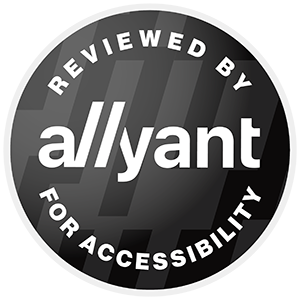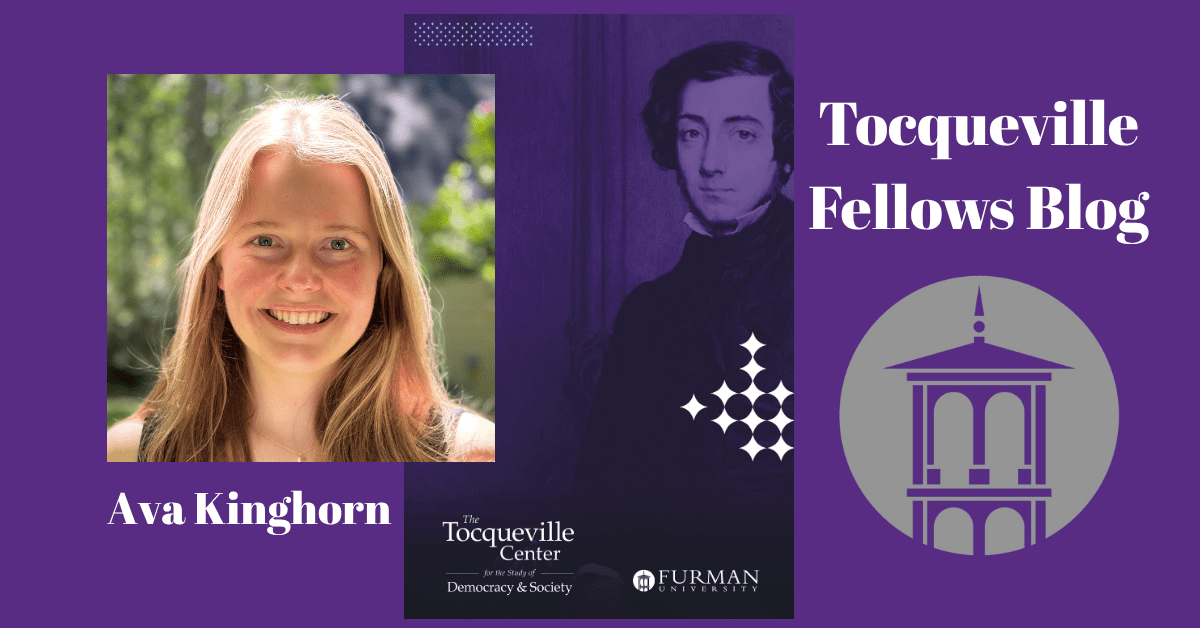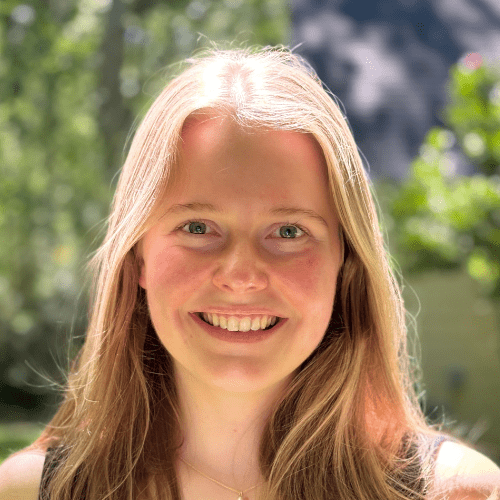Ava Kinghorn, from Durham, NC, is a Furman University student double-majoring in Mathematics and Religion on the Pre-Occupational Therapy track and a Tocqueville Fellow exploring the intersection of faith, reason, and public life.
In early October, the Tocqueville Center invited illustrious scholars Mark Noll and Kaitlyn Schiess to engage the topic of “Religion and the American Founding.” Their lectures and panel discussions broached a plethora of thought-provoking topics under this umbrella, but one theme consistently emerged: despite the Bible’s ubiquity, neither the Revolutionary-era colonists nor us modern Americans have any sort of common understanding of the way Scripture informs politics. We lacked and continue to lack a unified approach to biblical literacy.
This is most apparent in two ways. First, Dr. Noll highlighted the opposing uses of Scripture during the American Revolution. As a people rooted in the same Christian faith, both the Patriots and the Loyalists used biblical defenses of their respective sides of the conflict. The spine of “America’s book,” as Dr. Noll called it, bound the pages on which the foundations for both the republic and for the monarchy were laid. “For every Exodus sermon,” he notes, “there was a Romans 13 sermon.” Expanding on this, Ms. Schiess expressed concern about the view of the Bible as a “treasure trove of quippy, moral truisms” from which we can pull a line or two to support any pre-determined political opinion. The Bible is a large book—surely there is something to be found.
This tendency to “cherry pick”—a tendency to which we still fall prey—largely contributes to the second illustration of our history of disorganized and inconsistent biblical interpretation. As Ms. Schiess noted, American politicians have often used biblical references without attributing them to or even knowing that they come from the Bible. Over time, this has stripped this language of its theological context. Ms. Schiess strikingly calls us “Bible haunted”—our language is infused with Scripture, yet empty of its significance.
So, arises the question, how do we fix this? How do our politicians learn to recognize and to apply Scripture in a more true and faithful way? In short, how do we improve our politicians’ biblical literacy?
Though this question remains to be answered in full, our speakers provided some helpful insight. In particular, Ms. Schiess suggested that the church should be a voice of guidance for the use of Scripture in politics. The Bible is and has always been the church’s book. As such, perhaps it could provide thoughtful reason and direction for politicians.
Her suggestion is excellent. It is helpful to see and to mimic good and faithful interpretation modeled by those who are biblically literate. It is formative to receive guidance from a seasoned source. It is good to listen to insightful and substantive commentary. In this role, the church has much to provide.
We must ensure, however, that the church is and will continue to be this good voice. Christians are certainly not immune to the temptation to manipulate Scripture to serve their purposes. If the church is to be an exemplar of sound and proficient biblical literacy, Christians should strive to become biblically literate themselves.
As a Christian who desires for Scripture to be used well in public life, I ask: how do we do this? First, we must take Ms. Schiess’ advice. We must listen. We must turn our ears to the wisdom of Scripture and to Christians equipped with the gifts of sharp interpretation. We must be curious and attentive.
But to truly learn a skill, it must be practiced. Listening is necessary but insufficient. We must find spaces where we can practice our own habits of faithful interpretation—reading, analyzing, and applying Scripture, to name a few—instead of purely hearing what this sounds like from others. In other words, Christians must find spaces of interactive, personal, and dialogic participation rather than only the liturgical participation of church services. (Church services, undoubtedly, are beautiful and profoundly valuable; here, I am simply focusing on the distinctive strengths of more conversational, casual spaces.)
There are many settings in which the skills required of biblical literacy are employed. For some Christians, this may be Sunday School. For others, it might be bible studies or adult education classes. Young Christians may find this community in youth group. Church members may come together for weeknight small groups. A child may work through daily devotions with their parents. As in my case, college students may find this community in campus ministries or study centers. In all these spaces, we find gatherings of believers telling their stories and learning to weave them into a much larger understanding of how Scripture informs our life together. We are given ample opportunity to analyze our beliefs and behaviors and ensure they are properly rooted in the words of the Bible. I urge us all to spend our lives investing in these offerings.
In doing so, we strengthen the voice of the entire body of Christians. With a greater understanding of how to apply the truth of the Bible, we become better public witnesses—better extensions of the church’s voice in the political sphere. We become Americans better equipped to engage with the rhetoric of our politicians.
We also become parents, teachers, peers, coworkers, students, friends, and caretakers better equipped to be voices of thoughtful reason for each other, because, quite simply, we are all politicians. We are all involved in making decisions on how to operate well within groups of people. When Scripture is a part of that, we must devote ourselves to using it prudently and with great integrity.
At one moment during her comments, Ms. Schiess mentioned a question she remains most interested in as a theologian writing about and reflecting on our nation’s history: how, then, shall we live?
How, then, shall we live? We hear plenty of answers, many of them justified with biblical language. We must devote the time to listening to them and then to discerning their truth with trained eyes. And then we must ask the question ourselves. How, then, shall I live? How, then, shall my family live? How, then, shall my community live? How, then, shall my nation live? These questions are important. Let us become people who commit to careful and constant development of our biblical literacy so that we can, with informed voices, ask together, “How, then, shall we live?”
3300 Poinsett Highway
Greenville, SC 29613
864.294.2000
Furman University does not unlawfully discriminate on the basis of race, color, national origin, sex, sexual orientation, gender, gender identity, pregnancy, disability, age, religion, veteran status, or any other characteristic or status protected by applicable local, state, or federal law in admission, treatment, or access to, or employment in, its programs and activities.


